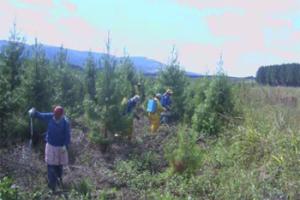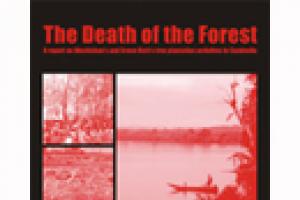This month WRM is launching a new occasional section to the bulletin: "Pulp Inc". The series will consist of profiles of companies involved in the pulp and paper industry.
In order to campaign effectively on the industry (and certainly before NGOs start talking about collaborating or cooperating with companies), we need to take a careful look at how the industry is structured and the nature of the companies involved in the industry: what they are and what they are not.
Large-Scale Tree Plantations
Industrial tree plantations are large-scale, intensively managed, even-aged monocultures, involving vast areas of fertile land under the control of plantation companies. Management of plantations involves the use of huge amounts of water as well as agrochemicals—which harm humans, and plants and animals in the plantations and surrounding areas.
Bulletin articles
7 April 2006
The Eighth Conference of the Parties of the United Nations Convention on Biological Diversity ended on March 31st with two important and related decisions: an upholding of the moratorium on the use of so-called “terminator technology,” and a recommendation that countries exercise caution when approaching the potential use of genetically engineered trees. The issues became related during the deliberations over the issue of extending the moratorium on the use of the dangerous “terminator technology,” the genetic engineering of plants to produce sterile seeds that cannot be replanted.
Bulletin articles
7 April 2006
The Omo Forest Reserve –located in the South west of Nigeria- was legally constituted as a forest reserve by Order No. 10 of 1925 and the Order was amended in 1952. The forest was practically unexplored by then. The forest was ceded to Government for reservation on the 8th of October, 1918. The agreement was made between the District Officer, Ijebu Ode on behalf of the British Colonial government and the Awujale of Ijebu Ode on behalf of the Ijebu Native administration.
Bulletin articles
7 April 2006
As part of a two-year process to review FSC policy on the certification of timber plantations, members of the policy review working-group (PWG) recently visited South Africa for their final meeting. What follows are some quotes from the report on the field trip to visit plantation areas, produced by Wally Menne (member of the local Timberwatch Coalition).
Bulletin articles
7 April 2006
Another new FSC certificate of a major logging operation, this time in Indonesia, has got forest watchers scratching their heads.
Bulletin articles
7 April 2006
In Malaysia, women plantation workers appear to have been neglected in the Government’s plans to eradicate poverty and enhance the status of women. The progress achieved so far in empowering women has been unequal. Women plantation workers still lag behind, since they are unable to free themselves from the vicious cycle of poverty they find themselves in.
Bulletin articles
7 April 2006
According to Recommendation no. 01 of 18 November 2005, the Federal Public Ministry, through the Attorney of the Republic in Ilheus-Bahia, is demanding the removal of eucalyptus plantations in a radius of 10 (ten) kilometres in the buffer zones of the Conservation Units of the Do Descubrimento, Monte Pascoal and Pau Brasil National Parks, as determined by Brazilian legislation.
Bulletin articles
7 April 2006
A new FSC certificate of a major logging operation has again raised eyebrows among foresters, environmentalists and human rights activists. In Guyana, the Swiss certification company SGS Qualifor has just granted an FSC certificate to the Malaysian-Korean logging giant, Barama Company Limited (BCL), which operates a 1.69 million hectare concession in North West Guyana.
Other information
5 April 2006
Only in available in Spanish -
Por Javier Baltodano - Grupo de Trabajo en la Revisión de las Políticas de Certificación a Grandes Plantaciones FSC .
Introducción:
Publications
18 March 2006
By the World Rainforest Movement
Proponents of industrial tree plantations argue that the plantations are “reforestation”, increasing the area of forest, providing jobs for local people, or reducing pressure on natural forests. This report examines these companies’ operations in Cambodia, the impacts observed to date on the local populations and the environment, and the associated human rights violations.
Other information
14 March 2006
By Ricardo Carrere -
Bulletin articles
7 March 2006
Biodiversity loss is rapid and ongoing. Over the last 50 years, humans have changed ecosystems faster and more extensively than in any comparable period of time in human history. Tropical forests, many wetlands and other natural habitats are shrinking in size. Species are going extinct at rates 1,000 times the background rates typical of Earth’s past. The direct causes of biodiversity loss --habitat change, overexploitation, the introduction of invasive alien species, nutrient loading and climate change-- show no sign of abating. ...



